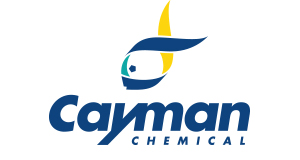TNF-α Chimeric Mouse-Human Monoclonal Antibody (Clone CDP 571)
TNF-α Chimeric Mouse-Human Monoclonal Antibody (Clone CDP 571)
Artikelnummer
CAY37178
Verpackungseinheit
200 µg
Hersteller
Cayman Chemical
Verfügbarkeit:
wird geladen...
Preis wird geladen...
Shelf life (days): 365.0
Formulation: 200 µg of protein A-affinity purified monoclonal antibody
Immunogen: Human TNF-α
Clone Designation: CDP 571 (Humicade)
Target specificity: Human, Rat
Cross Reactivity: + TNF-α
Uniprot ID: P01375
Formula Weight: 0.0
Notes: TNF-α is a cytokine and member of the TNF/TNF receptor (TNFR) cytokine superfamily.{54137} TNF-α is produced as a 233-amino acid transmembrane precursor protein from which mature, soluble TNF-α is formed by proteolysis.{54138} Soluble TNF-α is a 157-amino acid polypeptide, cleaved from the precursor protein on the extracellular side of the membrane, that forms bell-shaped homotrimers with the C-termini at the base, each containing three receptor interaction sites.{54139} It is primarily produced by activated macrophages but can also be produced by a variety of other cells, such as T cells, natural killer cells, and osteoblasts.{54139,54140} TNF-α binds to and activates its receptors, TNFR1 and TNFR2, which are associated with intracellular protein complexes that activate caspases to induce cell death, induce p38 MAPK signaling, and initiate NF-κB or AP-1-mediated transcription of immune and inflammatory mediators.{54141} TNF-α promotes inflammation partly by inducing endothelial cells to express adhesion molecules, COX enzymes, and pro-coagulant factors.{54140} Exogenous TNF-α induces death of cancer cells in vitro, as well as disrupts tumor vascularization and induces tumor necrosis in vivo, but it has tumor-promoting properties when produced in the cancer microenvironment.{54137,54143} In contrast, it plays a role in resistance to infection, with mice lacking Tnf having an increased susceptibility to certain microbial infections but lacking resistance to leishmania.{54141} Tnf knockout mice are also resistant to certain types of cancer, including chemically induced skin carcinogenesis.{54137} TNF-α increases lung metastases in a mouse model of fibrosarcoma, an effect that can be reduced by an anti-TNF-α antibody. Mice overexpressing Tnf develop an arthritis similar to rheumatoid arthritis in humans.{54142} TNF-α is produced in the inflamed tissues of patients with inflammatory diseases such as rheumatoid arthritis and neutralizing antibodies to TNF-α reduce the levels of TNF-α in vitro and in mouse models of the disease.{54140} Cayman’s TNF-α Chimeric Mouse-Human Monoclonal Antibody (Clone CDP 571) was produced recombinantly from the original CDP 571 antibody sequence and can be used for ELISA and as a neutralizing antibody. The CDP 571 antibody was generated by fusing human IgG4 constant domains to the antigen-binding domain of a mouse anti-human TNF-α monoclonal antibody.{67151}
Formulation: 200 µg of protein A-affinity purified monoclonal antibody
Immunogen: Human TNF-α
Clone Designation: CDP 571 (Humicade)
Target specificity: Human, Rat
Cross Reactivity: + TNF-α
Uniprot ID: P01375
Formula Weight: 0.0
Notes: TNF-α is a cytokine and member of the TNF/TNF receptor (TNFR) cytokine superfamily.{54137} TNF-α is produced as a 233-amino acid transmembrane precursor protein from which mature, soluble TNF-α is formed by proteolysis.{54138} Soluble TNF-α is a 157-amino acid polypeptide, cleaved from the precursor protein on the extracellular side of the membrane, that forms bell-shaped homotrimers with the C-termini at the base, each containing three receptor interaction sites.{54139} It is primarily produced by activated macrophages but can also be produced by a variety of other cells, such as T cells, natural killer cells, and osteoblasts.{54139,54140} TNF-α binds to and activates its receptors, TNFR1 and TNFR2, which are associated with intracellular protein complexes that activate caspases to induce cell death, induce p38 MAPK signaling, and initiate NF-κB or AP-1-mediated transcription of immune and inflammatory mediators.{54141} TNF-α promotes inflammation partly by inducing endothelial cells to express adhesion molecules, COX enzymes, and pro-coagulant factors.{54140} Exogenous TNF-α induces death of cancer cells in vitro, as well as disrupts tumor vascularization and induces tumor necrosis in vivo, but it has tumor-promoting properties when produced in the cancer microenvironment.{54137,54143} In contrast, it plays a role in resistance to infection, with mice lacking Tnf having an increased susceptibility to certain microbial infections but lacking resistance to leishmania.{54141} Tnf knockout mice are also resistant to certain types of cancer, including chemically induced skin carcinogenesis.{54137} TNF-α increases lung metastases in a mouse model of fibrosarcoma, an effect that can be reduced by an anti-TNF-α antibody. Mice overexpressing Tnf develop an arthritis similar to rheumatoid arthritis in humans.{54142} TNF-α is produced in the inflamed tissues of patients with inflammatory diseases such as rheumatoid arthritis and neutralizing antibodies to TNF-α reduce the levels of TNF-α in vitro and in mouse models of the disease.{54140} Cayman’s TNF-α Chimeric Mouse-Human Monoclonal Antibody (Clone CDP 571) was produced recombinantly from the original CDP 571 antibody sequence and can be used for ELISA and as a neutralizing antibody. The CDP 571 antibody was generated by fusing human IgG4 constant domains to the antigen-binding domain of a mouse anti-human TNF-α monoclonal antibody.{67151}
| Artikelnummer | CAY37178 |
|---|---|
| Hersteller | Cayman Chemical |
| Hersteller Artikelnummer | 37178-200 |
| Verpackungseinheit | 200 µg |
| Mengeneinheit | STK |
| Reaktivität | Human, Rat (Rattus) |
| Klonalität | Monoclonal |
| Methode | ELISA |
| Isotyp | IgG4κ |
| Wirt | Other |
| Konjugat | Unconjugated |
| Produktinformation (PDF) | Download |
| MSDS (PDF) |
|

 English
English







